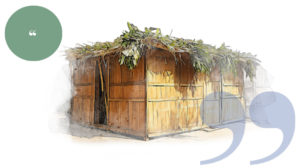Good Shabbos: How to Achieve it


Shabbos is called the day of rest, but for many mothers, the holiness and rest is elusive. The children are all home, schedules are upturned, and there are three meals to set, serve, and clear. How can experience the simchah and spirituality of Shabbos — together with our children? Family First offers some practical advice and tips, collected from a number of Jewish mothers and grandmothers, but primarily from Rebbetzin Denah Weinberg, principal of EYAHT seminary for women in Jerusalem, who is renowned for her lectures on how to maximize Shabbos.
Shabbos All Week
Shabbos shouldn’t just be the day that comes at the end of the week when we crash, but the highlight that the whole week is leading up to. With this in mind, if we start preparing for Shabbos not on erev Shabbos, but the week before, by the time Shabbos actually comes, we’ll excited and ready to welcome her.
- All through the week, every time we pick up something good to eat, put it aside for Shabbos. Rebbetzin Weinberg even suggests having a special Shabbos cabinet where you save all the special goodies for Shabbos — and keep it locked!
- Decide early on in the week what you, and the whole family, will be wearing for Shabbos and make sure everything is in good order — no tears, stains, or missing buttons. Even a small, seemingly trivial thing like a stain on your Shabbos suit can put a stain on your Shabbos ...
- Make something for Shabbos every day and freeze, not just to save time on Erev Shabbos but to bring an awareness of the upcoming day into every day.
- Talk to the kids about Shabbos every day, reminding them that Shabbos is getting closer and closer. They’ll look forward to Shabbos more — and so will you!
Fun and Games
“We have to think to ourselves, why should kids look forward to Shabbos? What’s in it for them? For many kids, Shabbos is when Mommy and Tatty collapse, or the house is full of guests and they get no attention, or they’re forced to sit at the table for hours.” Rebbetzin Weinberg’s statement is blunt, but sadly, often all too true. So what can we do to make Shabbos enjoyable for the children?
First, the rebbetzin suggests, brainstorm with your kids. Ask them what they would like to do on Shabbos, what would make Shabbos exciting for them. Make a list of all the doable items and try to accommodate as much as possible. Some ideas could include the following, but ultimately, whatever works for your family and kids is good:
- Special games and books saved for Shabbos. These should be put away and brought out only on Shabbos. Games that can played by the whole family can be great fun and keep everyone happy.
- Lots of goodies — favorite snacks, candies, cake. Shabbos is not the time to say no to candies; they can brush their teeth extra well on Motzaei Shabbos!
- Kids want and need our attention, so instead of burying our heads in the latest frum novel, think up some family activities. Taking a walk, after the evening meal in winter or on the long summer Shabbos afternoons, whether to the local park or a different neighborhood, gives the family a chance to interact in a relaxed way. Visiting Bubby, an elderly neighbor, or relative is not only a mitzvah, but interesting for the children too.
- Try to incorporate individual time learning with Tatty or reading a story with Mommy — special attention makes Shabbos special for a child.
“Simchah at the Shulchan”
How can you turn the Shabbos table from a battleground into a pleasant place to be?
- “Be careful that Shabbos doesn’t become a testing ground for what the kids learned all week,” warns Rebbetzin Weinberg. “Ask them if they want to prepare a dvar Torah for the table — don’t force them, but do offer a nice treat for those who do say over something!”
- Make the table the place to be on Shabbos — even letting the children bring books to the table. Better they should read them at the table than disappear into their room.
- How can you stop those whispers and sly under the-table kicks during Kiddush — or during the entire seudah? “Bribe, bribe, bribe,” says Rebbetzin Weinberg. “We like to call it incentive, but whatever you call it, it works!” Instead of allotting set roles to each child — who gets to give out the wine or the challah, for example — give the roles as prizes those who sit nicely during Kiddush. They don’t want to sing? Tell them whoever sings nicely gets ice cream. And plenty of other treats for those who behave themselves at the table — that way, says Rebbetzin Weinberg, the kids will want to behave well instead of being forced!
- Ask the kids what foods they would like for Shabbos and try to provide it, so they’ll want to come to the table to eat.
- Have two children sit next to Tatty and two next to Mommy. You may not get to say much to your husband, but four children will feel connected to a parent.
Making Time for Mom
Many women find that the spirituality of Shabbos gets lost somewhere in between changing diapers, refereeing fights, and clearing up spilled juice for the fifth time. Here are a few suggestions to help us tune into Shabbos.
- “Start preparing yourself spiritually for Shabbos on Sunday,” says Rebbetzin Weinberg. “Don’t wait until Shabbos to hear what the parshah is from your children’s parshah Take ten minutes each day to learn the parshah, to tune into the ascending spirituality. Also prepare some simple stories to give over at the Shabbos table — for your sake. It will make your Shabbos so much richer.”
- Make time to daven. Hard as it may be with many small children, if we want to feel the spirituality of Shabbos, we need to plan so we have both the time and quiet space to daven properly. Whether that means getting up early — even before the kids —- so you can daven in peace; or asking your husband to watch them when he comes back from shul; or even making the effort to go out to shul if it’s possible. This last option, even though it might be the hardest, has the added advantage of an outing for the kids, and, if you have the table set up before you leave, you and the whole family comes back from shul uplifted and ready to enjoy the seudah. (Although not at the expense of other people’s tefillah — if your kids can’t be quiet in shul or play outside, stay home!) But whatever you do, daven. As Rebbetzin Weinberg so wisely pointed out, “You say it’s hard to find time to daven with all those kids? If you have all those kids, you’d better find time to daven — you need to daven to survive!”
- For those women who like to sing, finding, or hosting, a women’s Seudah Shlishis might be an option. Singing together with other women can be incredibly moving. But don’t kick your husband out of the house if he wants to eat Seudah Shlishis at home!
- Going to a shiur on Shabbos is wonderfully inspiring — if you can escape from the house. If you can’t, learn at home. Get up ten minutes earlier, or go to bed ten minutes later, whatever works for you, but learn something that inspires you — just ten minutes of learning can change your entire Shabbos.
- Dress up! Says Rebbetzin Weinberg emphatically, “No robes on Shabbos!” Not even if it’s the most beautiful, elegant, embroidered velvet,” I plead? Not even. “At the end of the day, it’s just a robe, and you don’t get the kedushah. Dress up in a beautiful outfit, feel like a queen, and you’ll feel Shabbos.”
(Originally featured in Family First, Issue 213)
Oops! We could not locate your form.












